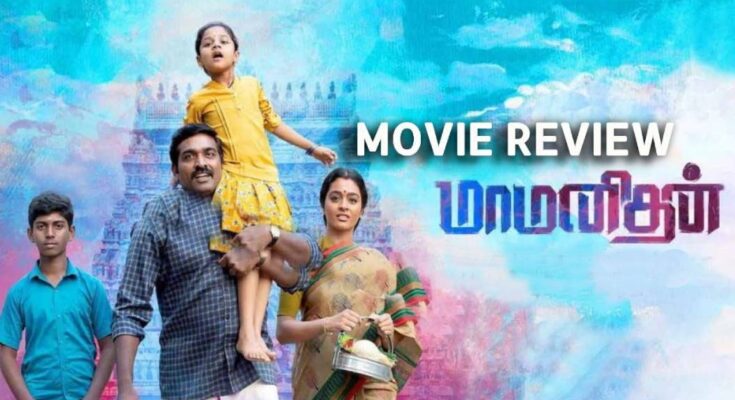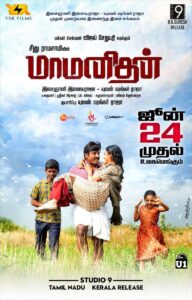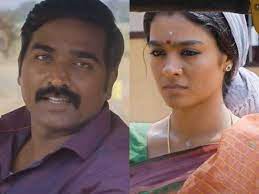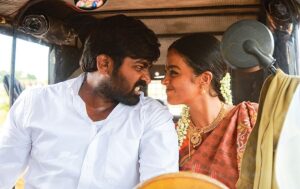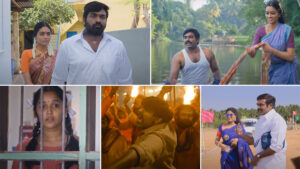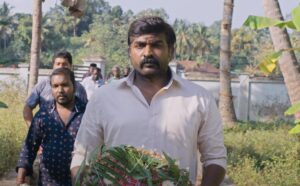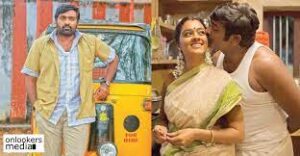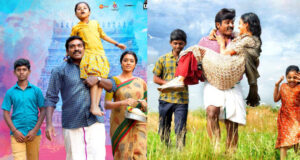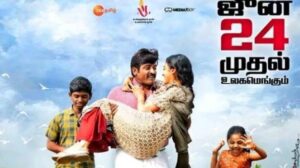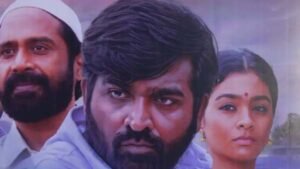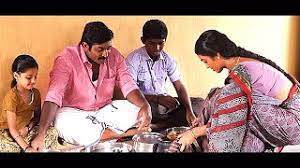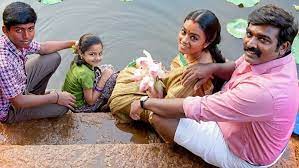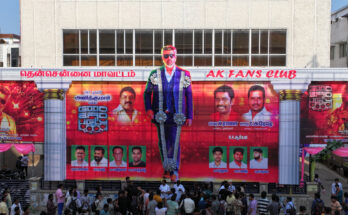‘Maamanithan’ Movie Review
Cast-;
‘Makkal Selvan’ Vijay Sethupathy, Gayathrie, Guru Somasundaram, Shaji Chen , Jewel Mary , K. P. A. C. Lalitha ,
Anikha , Ganja Karuppu , Manasvi Kottachi , Saravana Sakthi & Others .
Crew-;
Directer – Seenu Ramasamy ,Writter – Seenu Ramasamy , Producer – Yuvan Shankar Raja , Shan Sutharasan , Cinematography – M. Sukumar , Editer – Sreekar Prasad , Music – Ilaiyaraaja , Yuvan Shankar Raja , Karthik Raja
Production company – YSR Productions , Distribute – Studio 9 Productions , Producer – Yuvan Shankar Raja (YSR FILMS PVT LTD) , Art – Vijay thennarasu , Lyrics – Pa Vijay & Karunakaran , Stills – Manju Adithya P R O – Nikkil Murugan and Others .
Story-;
Radhakrishnan (Vijay Sethupathi) is a humble auto driver, who is sincere and extremely honest. He is content wi th his life which revolves around the auto, his wife Savithri (Gayathrie) and his 2 kids. His kids study in a gover n ment school, and he wishes to improve their standard of education by admitting them into a private school. To achieve this, he promises a real estate businessman Madhavan (Shaji) that he’ll help him sell all the plots, but ge ts cheated by Madhavan. . Little does he know that he would be trapped in this issue and end up running away from his family and village. Radhakrishnan’s arc of redemption and the people he meets from different walks of life in this journey form the rest of the plot of Maamanithan. The consequences he and his family face form the rest of the film.
Watch The Trailor -;
Movie Review-;
It was a social science class that I wasn’t interested in. I was afraid a similar fate would fall upon Maamanithan, a s well. In the opening scene of this Sethupathi starrer, his character, Radhakrishnan, teaches his children (a son and a daughter) the importance of running. He tells them that running frees them. But his piece of advice comes out of nowhere, and, hence, I didn’t think it would serve any purpose other than depicting the bond between a father and his kids. Watching this film by Seenu Ramasamy, it seems that the film production has been a rather long-drawn-out affair. It has travelled through several ups and downs, giving us the feeling of a tired traveller. Despite the presence of an amazing actor like Vijay Sethupathi, who is able to navigate many of his films on his shoulders, this film seems to be losing its way, and that’s largely because it lacks a central dramatic focus. How ever, Radhakrishnan runs sometime later. It’s not the kind of running that tests his stamina, though. He runs a way – from his family to find another shelter. Maamanithan is surprisingly honest.
It doesn’t beat around the bush and tells a nice story straight from the heart. In the scene where Radhakrishnan talks about running, there are some dialogues about eating fish, as well. It starts off as Sethupathi, playing Radha Krishnan, an honest auto-riksha driver in a small rural town wanting to educate his two kids through a good Eng lish-speaking education system. His wife Savitri (played by Gayathrie), assures him full moral support. Somehow, he meanders into a bogus real estate deal into which he gets trapped by Madhavan (played by Shaji Chen), a pers on you can smell out as a crook from a mile away, but Sethupathi cannot. That trap leads him into running away t o Kerala on a wild goose chase to catch the culprit by abandoning his own wife and kids. He meets the culprit’s ageing mom played by KPAC Lalitha, who is in tears hearing his plight. As an act of balance, he plays good Sa ma ritan by helping another young Christian girl there. This dramatic angle also comes to a rather abrupt end after about seven years, when he abandons this little girl and goes out to Varanasi.
The daughter asks if it’s wrong to kill something in order to eat it, and the father says he doesn’t have an answer to that. He doesn’t come up with anything smart on the spot. But they go home and happily gorge on fish curry a nyway. This attitude of his comes in handy towards the end when he’s asked by a young sage if he knows the me aning of Advaitism. It’s a standout scene that deserves applause for the way Sethupathi delivers his line. He says he only knows how to stop hiccups and walks out of the restaurant, leaving his questioner dumbfounded. Arri ving in this new town, the script changes focus yet again when he decides that the time has come to seek a spi ritual path on the river Ganges. Here, he encounters Madhavan, the culprit, by sheer coincidence, and finds out that he is suffering from an incurable disease. And just when he decides to journey on further, his wife and son arrive there and help the film to a happy ending. One can clearly see what starts off as a homage to Kamal Haa san’s Mahanadhi, which deals with a similar good guy getting trapped in crooked deals, losing its way.
There’s no arrogance in his body language. And he doesn’t turn around to punctuate his punch line with a period. Still, it’s comedy gold. Alas, it’s also the only place where I laughed out loud. Now, let’s get back to the beginning. Radhakrishnan is an auto driver who wants his kids to speak English. With the money he makes from driving ar ound, though, he won’t be able to enroll them in a better school. His main dream is to get them educated. And for that, he takes up another job that he’s naturally good at. The real problem is in the style of narration. All the cruc ial turning points are narrated as flashbacks by secondary characters or as voiceover narrations. When some th ing like this happens to a screenplay device, we lose out on whose point of view the story is from and whom it is being told from. As a result, we the audience are not allowed into the story in the form of a direct engagement. We end up hearing second-hand experiences that are prima facie unauthentic.
Overall, what we end up watching is the ability of a deeply wounded young man transforming into a Christ-like fi gure capable of forgiving the crook who ruined him and his family. This “Maamanithan”, the great man now danc es wild among all the ganja smoking Swamijis on the burning guards as a final act of self-redemption. Why? How? Where does it all change? Who was responsible for all this? We don’t know. The cinematography by M Sukumar is extremely patchy, giving you the feeling that the crew had to somehow wrap up everything in a hurry.
The dub bing is even worse and just when you expect Raja (Ilaiyaraaja) and Yuvan Shankar Raja to deliver their he aling m usical touch, you realize the guy on the mixing table has pushed all the background music into the lou dest volu me levels, drowning all the effects laid out in other tracks. The soundtrack is a disaster, but what really stands o ut in this rather torrid saga are three excellent performances — Savitri played by Gayatrie has a kind of restraint and naturalness not seen much on the Tamil screen.
The way she blends into the landscape, along with her small family, is amazing. Even when Savithri (Gayathrie), h is wife, warns him regarding the perils of making a quick buck, he doesn’t listen to her. His intention is linked di rectly to making his kids reach the top. And education, he truly believes, will get them there. He’s definitely right about that because it’s an antidote. What he doesn’t get right, however, is the manner in which he trusts all and sundry. When he finally lands in trouble, he runs away, as it’s the easiest option that he can put his hands on.
And then you have Somasundaram playing Ismail, Sethupathi’s best friend and saviour of the abandoned family. Hon estly what a relief it is to see a Muslim character given some importance in an Indian film. This kind of incl usivity had almost been given up as a lost cause. I sincerely hope that other filmmakers in the future take this lead and st art developing more characters from the Muslim community. And then we have Jewel Mary playing Pilomy a tea vendor in the backwaters of Alleppey, who accommodates Radhakrishnan.
What a radiant presence. She’s one of the rare actors who just does not perform or exert herself to play her role. So, what could have been a well-crafted Hitchcockian drama of a small lower middle-class family facing a crisis beyond their comprehension, loses track and becomes a rather confused affair. So, let’s just blame it on the inco nveniences caused by the pandemic of the last two years on a crew, which was ill-equipped also to handle their crisis, too.Maamanithan doesn’t wear its coat on the shoulders of a thriller. There are no shocking revelations th at tumble out of the closet in the third act, although you’ll get one if you sit through the movie.
But that’s not the most interesting aspect here. Writer-director Seenu Ramasamy seems to prod at the sentim ents that make us w ho we are. The title, which translates to a great man, is obviously related to the protagoni st’s soul. We get to und erstand Radhakrishnan’s greatness as the movie progresses. What is greatness, by the way? Doesn’t it dep end o n what one does in a given situation? What do we do when push comes to shove? Sa vithri is also great if you thi nk about it. She raises her kids in the same village where her husband gets badm outhed day in and day out.
Doesn’t she sacrifice her sanity in a way? But Ramasamy only gives us glimpses of the insults she faces and not t he triumphs she embraces.Maamanithan would have been a different film if the cam era’s gaze had followed Sa vithri. Both of them suffer, but the filmmaker makes us sympathize mostly with Radh akrishnan’s problem s.Then again, this is a drama that brings together people from different religions. Radhakri shnan’s best friend is a Mus lim. And the woman he befriends in Kerala, where he finds a roof over his head, is a Christian. Although there are religious symbols everywhere, differences do not crop up anywhere.
Ramasamy wants us to know that people of all faiths can live peacefully. This is a matter that has been dealt with extens ively – and hilariously – in the rec ent Telugu release, Ante Sundaraniki, as well.In that Telugu movie, the castes and faiths are mentioned and lugg ed around, whereas, in Maamanithan, they simply become a part of the wallp aper.The new troubles for Sethu pathi and Gayathrie are a far cry from the ones they encountered in Nad uvula Konjam Pakkatha Kaanom (2012). In the decade that has passed since then, they have grown as actors individ ually, and as an on-screen couple that we can all shower our love upon
This IS MY Personal Review So Please Go And Watch The Movie In Theaters Only
Written By- T.H.PRASAD -B4U-Ratting-5 /5
